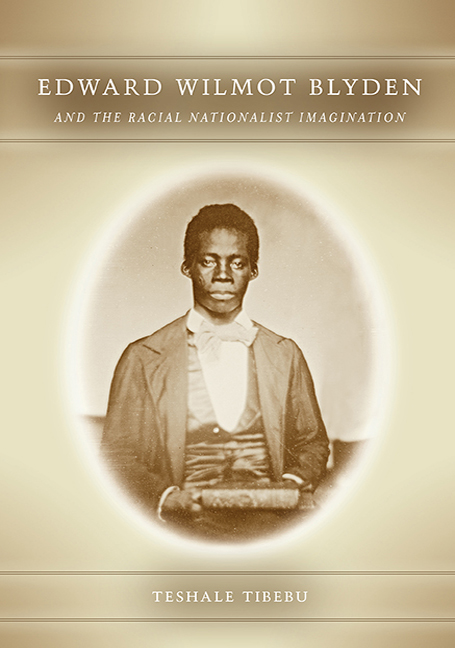Book contents
- Frontmatter
- Dedication
- Contents
- Acknowledgments
- Introduction
- 1 Africa: Service, Suffering, and Subjection
- 2 The Critique of Eurocentrism
- 3 Ishmael in Africa: Black Protestant Islamophilia
- 4 The African American “Civilizing Mission”
- 5 The “Mulatto” Nemesis
- 6 Appraising the Colonial Enterprise
- Epilogue: Post-Blydenian Reflections
- Notes
- Bibliography
- Index
3 - Ishmael in Africa: Black Protestant Islamophilia
Published online by Cambridge University Press: 08 April 2017
- Frontmatter
- Dedication
- Contents
- Acknowledgments
- Introduction
- 1 Africa: Service, Suffering, and Subjection
- 2 The Critique of Eurocentrism
- 3 Ishmael in Africa: Black Protestant Islamophilia
- 4 The African American “Civilizing Mission”
- 5 The “Mulatto” Nemesis
- 6 Appraising the Colonial Enterprise
- Epilogue: Post-Blydenian Reflections
- Notes
- Bibliography
- Index
Summary
Islam is the form that Christianity takes in Africa.
—Blyden, West Africa before EuropeIf the divinity of a religion may be inferred from the variety of races among whom it has been diffused, and the strength of its hold upon them, then there is no religion that can prefer greater claims than Islam.
—Blyden, Christianity, Islam, and the Negro RaceIn his philosophy of religion, Blyden refers to how different races gravitate toward one religion or another: “It is remarkable that the eight distinct religions of which history gives account all had their origin in Asia, and the three highest religions—the Jewish, the Christian, the Mohammedan—took their rise among Semitic peoples.” Furthermore, “it is equally remarkable that since Christianity left the place of its birth it has seemed to be the property exclusively of the European branch of the human family.” As Christianity “has become the possession of the Western Aryan, it has shared the fate of that other great religion which arose among the Eastern branch of the Indo-European family, viz., Buddhism, as being for the most part confined to one or two races.”
Blyden compares the Aryan and the Semitic “minds” in their views of the relation between God and humanity. It is the credit of the “West Aryan genius … to divorce God from His works, and to lay great stress upon human capability and achievement. Man is an end, not a means… . The more favoured race must dominate and control the less favoured race. Religion is to be cherished as a means of subserving temporal and material purposes.” In short, “Everything now depends upon man. Everything else is within his grasp. He may even by searching find God. Material progress is the end of the human race.”
According to Blyden, the Semitic mind is different from that of the Aryan. “The Semitic mind … destitute, it has been alleged, of the scientific instinct, looks upon man—every man—as standing in direct relation to God, who has not ceased His communication with His creatures, still speaking to them at times in dreams and visions, and at other times by the ordinary events of life.”
- Type
- Chapter
- Information
- Publisher: Boydell & BrewerPrint publication year: 2012

